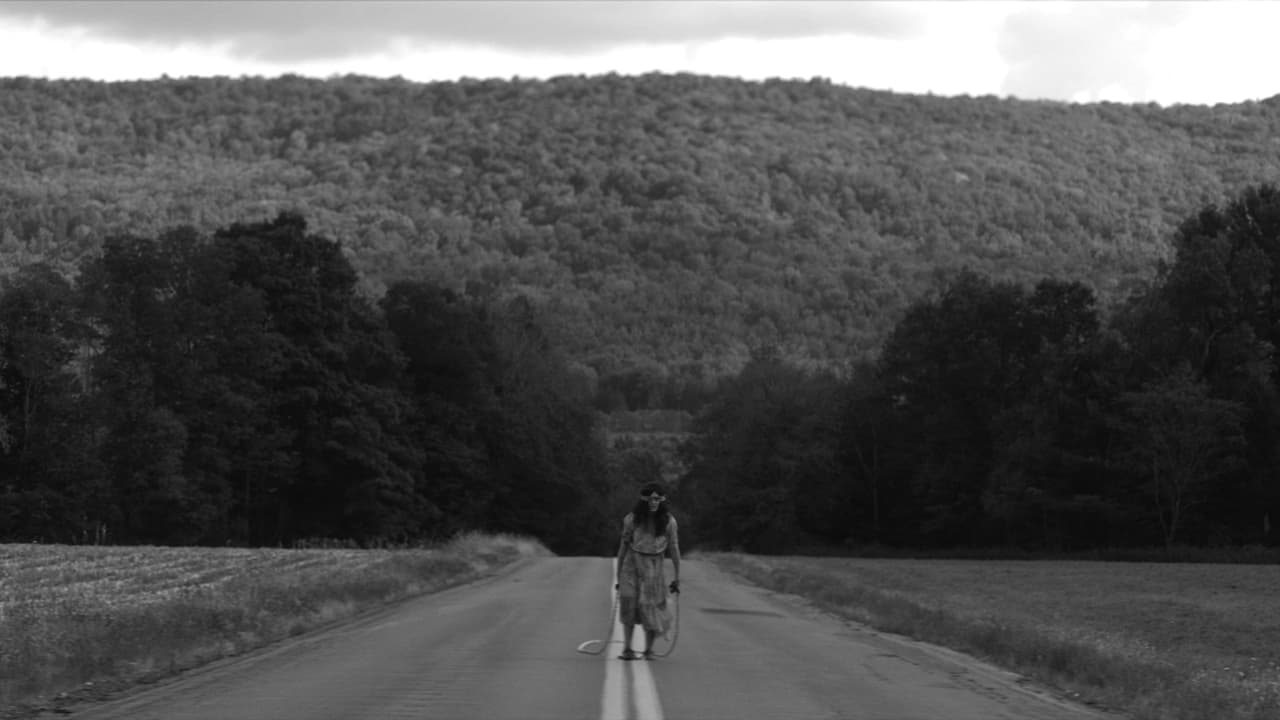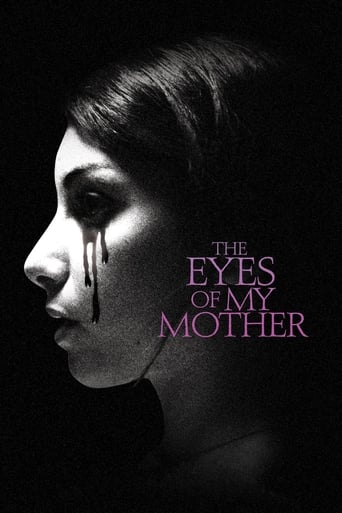

The Eyes of My Mother is a chilling psychological horror film. I found this film scrolling through Netflix and knew nothing about it, other than the brief and vague summary. After viewing all 76 minutes of it, I can honestly say I was fairly floored. The film begins with the young main character, Francisca, tending to the cows on her rural and isolated farm home with her mother, am older portuguese woman who used to work as an eye surgeon. She explains the legend of Saint Francis of Assisi to Francisca and they go inside to clean the head of one of the cows. Later on, a strange door to door salesman comes to their home and asks to come in and use their bathroom. You know where this is going. The aging father returns home to find Francisca unharmed and the man mutilating the body of the mother in the bathroom. Chillingly undisturbed, the father knocks the man unconscious and chains him up in the barn, before making Francisca clean the bathroom and help him bury the mother's body, which she does quietly and compliantly. The next day Francisca goes to the barn to tend to the man's wounds, and inquiries about his desire for killing. When he asks if she plans to kill him, she sincerely responds, "why would I kill you? You're my only friend. I'm going to take care of you." Where the film goes from here, I will leave unexplained. It's worth experiencing for yourself with no knowledge. There are influences apparent here: I see similarities to both Lars Von Trier's 2009 film Antichrist, as well as Cormac McCarthy's 1973 novel Child of God. I don't know if I would call it better than either of these works, but it is fascinating in it's own right. With subject matter like this, it would be far too easy for this film to devolve into a simple fucked-up torture porn gore fest, but to the contrary, the violence, while there and disturbing, is handled surprisingly elegantly and with restraint. Many of the most gruesome moments are not shown onscreen, and when violence is shown, it is brief and not very bloody. This isn't to say the film is watering down anything, quite the contrary: the film is very deeply disturbing and many of these images will sear into your subconscious and refuse to go away. This is because the director understands what makes effective horror- it is what you don't see, it is the subtle creeping things, it is the things that you notice in the frame that aren't forced into your face. Presentation is everything, and this film's presentation makes it chillingly effective. The use of long takes, wide angles, slow creeping movement in the frame, and especially how the subjects are left small in their environments in many shots, makes these images of depravity all the more disturbing. Despite this, the film is thankfully more than simply an exercise in how uneasy the audience can feel- there is a good bit to chew on thematically as well. This is ultimately a story about isolation and the damage it can have on a person in the long term. The mother's retelling of the story of Francis of Assisi at the beginning sets up much of the symbolism for the film- Francis spent much time in his life in isolation, and ended up being fatally afflicted with Trachoma (and infectious disease of the eye). Eyes are an important motif in the film that are returned to frequently, as well as what they represent- bearing witness, "seeing" into another person and the inner workings of their thoughts. It is the depravity Francisca witnesses as a child that scars her, and there are more instances of these things throughout the film that hopefully one will notice while viewing. This, paired with her lifelong isolation and loneliness, are the determining factors for her descent into depravity. Her being named for Saint Francis of Assisi is apparent and it creates a very interesting juxtaposition. Ultimately, despite the fact the she becomes a terrifying presence, we still fell deep sympathy for her, and to an extent, we understand her eventual fall, with no small thanks to the hauntingly real performance of the main actress. There are points in the film where you feel the story could be going into ridiculous territory, but it does not move in a predictable fashion. As I was watching this, I was dreading the point where a part of the film dragged, or there was some misstep in the story, but every shot in this film, every line, feels like the director and writer was completely confident in it succeeding, and it does. The directing and camerawork are also very pleasing for anyone that analyzes these things in a film. Right from the beginning, this cinematography is fascinating- the warm black and white gives the film an almost otherworldly feel, and the shots, whether it be two characters on a couch inside or a shot of the bucolic countryside, are all framed and composed like each one is a beautiful photograph and it is very visually pleasing. The film seems to be set during the 1950s or 60s, but it is very timeless and almost feels like it is set in a different world entirely. The fact that this is a director debut makes it all the more impressive. This isn't to say the film is entirely flawless- there is a piece of ADR near the beginning that I can only describe as awfully synced, and there are some scenes around the second act (the three acts are conveniently divided as I II and III) that feel slower and unnecessary to the film. Thankfully these are still somewhat interesting and don't detract from the film, although the film wouldn't be any worse without them. This definitely not a film for everyone: It is violent, it is disturbing, it is terribly sad, and it will certainly haunt you for long after it's over. I can't entirely fault someone for hating this film. But I was riveted from start to finish.
... View MoreA very bad movie that has no story whatsoever. And despite what the genre claims to be, this is not a horror.You expect something to happen during the movie to make it worthwhile watching, but this movie just teases you with very boring scenes until the very end.Imagine a movie that has a continuous prologue which lasts 70 minutes and then just ends without anything interesting happening.No actions, no story and funnily enough not even a sight of dialogue. Mr. Beans comedy movies have more dialogue.Not worth watching.
... View MoreAs far as "conventional" horror goes, this couldn't be more different. It's worlds apart in regards to what we tend to label as horror — no jump scares, no boogeyman to run from, and a distinct lack of gratuitous gore has allowed this film to standout as a genuine psychological terror. It's slow in the progression of plot, but the time it takes works as a boon in the long run. In creating a space of total isolation and loneliness, we're allowed to witness the full transformation of a traumatized (and, admittedly, thoroughly maladjusted) child into a young woman that doesn't have a grasp on the reality that exists outside her bubble of delusion. The meticulous nature of this slow burn story is an honest reminder that this is horror at its most human: this could easily be a reality for any of us.
... View MoreStrange, bizarre, unsettling. The subplots are all the more disturbing and explain the premise well. The cinematography is just fantastic! The use of black & white film stock, the lighting in the scenes, the intense focal distances, the lingering distance shots. This is how black and with films, done well, are just so very impressive. It is obvious the detail in each scene was no accident much like and great work, the stage is set for a reason. Make sure you take in the subtle placement of seemingly random objects.The unseen can be more upsetting than the typical goriness you usually come across in most of today's horror flicks. Camera angles, blocking of the actors and symmetry of each bit of the movie is many times lacking in what we are watching in today's horror films, you know what's happening, it is bothersome without buckets of blood. It works. When is comes to effective foley work, the audio we hear just off screen from television, record player or radio, it all is wonderfully orchestrated adding suspense or foreshadowing, remarkable but not in your face. I really also enjoyed the soundtrack, ire at times. All adding to the whole feel of the flick.The writing and dialogue is also amazing. Use of foreign language interaction to make a point makes you get an old world kind of feel, adding to the idea that something is happening. We may not understand culturally, but we are not really sure that is the problem. Why are these characters acting oddly? Our perceptions of what is really evil is put on it's head throughout the film. Fantastic! Who is really crazy, really sick, really perverse? Who should we really fear? As it is in real life, evil at first glance is hard to spot, but something in our cut tells us to be careful.Sometimes writers don't make great directors, but Nicolas Pesce hits this one out of the ballpark on both counts!
... View More